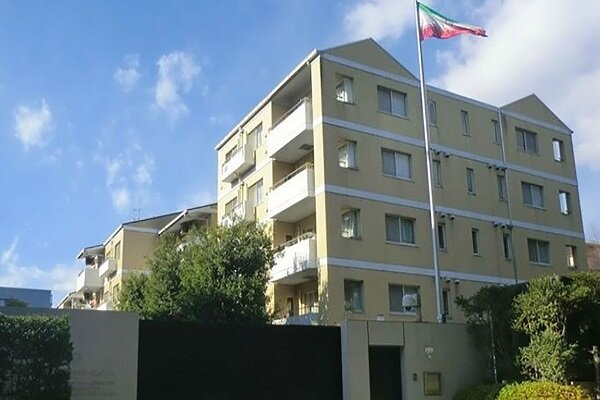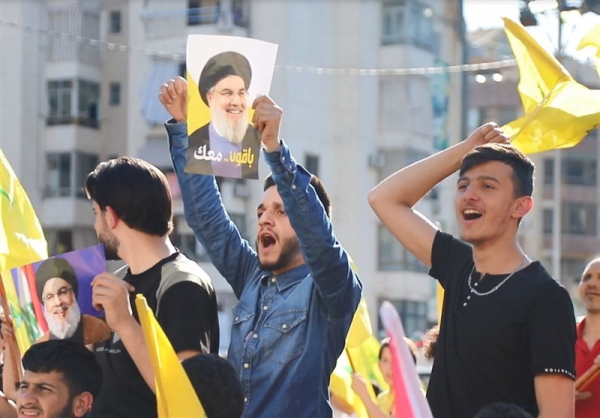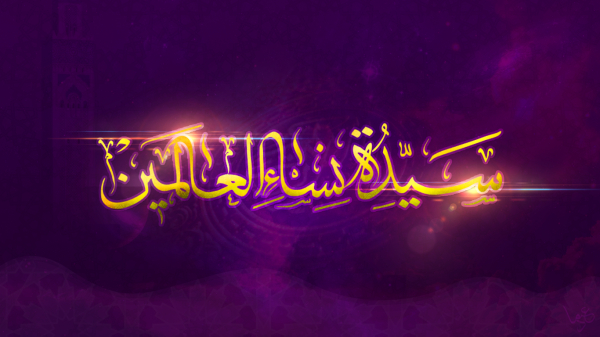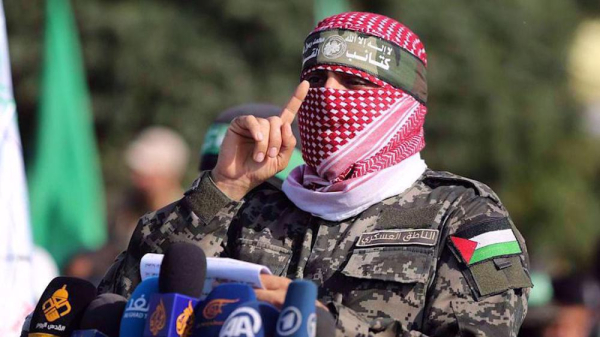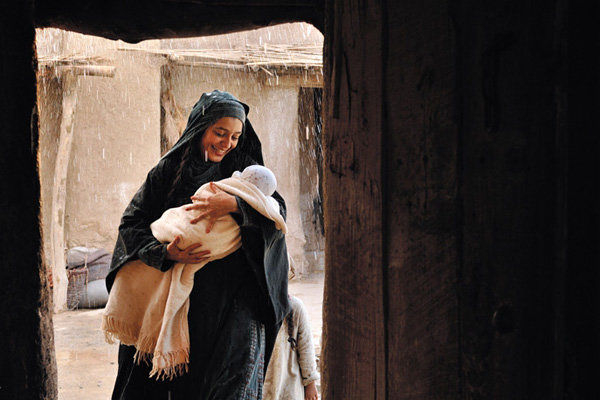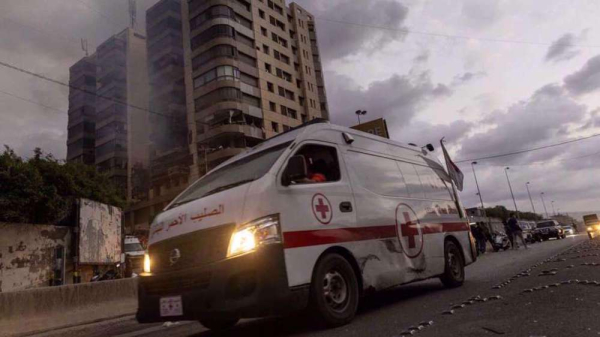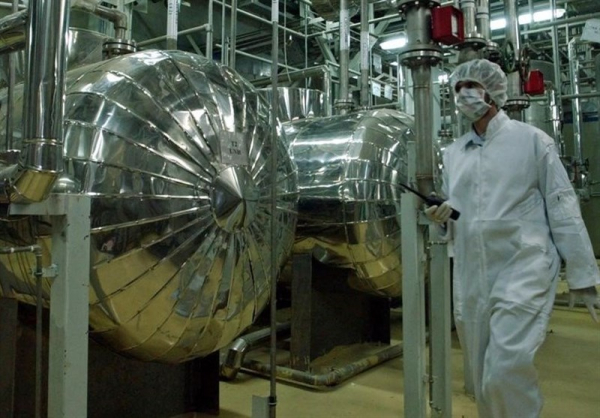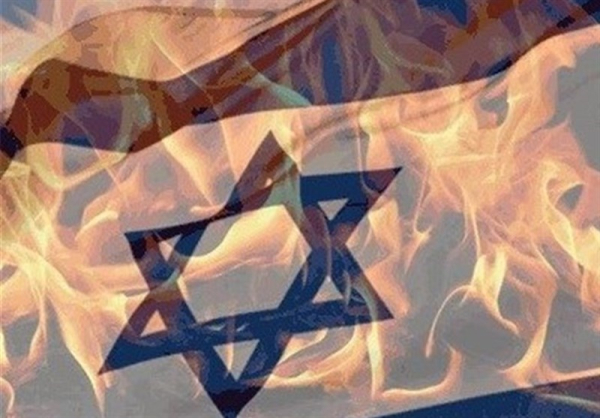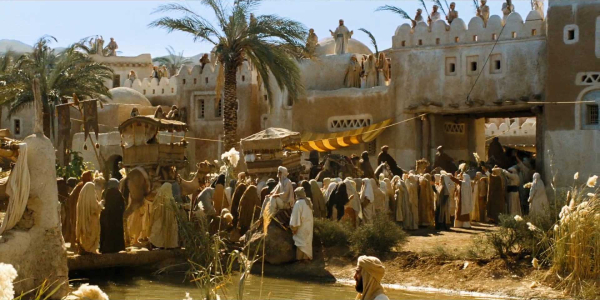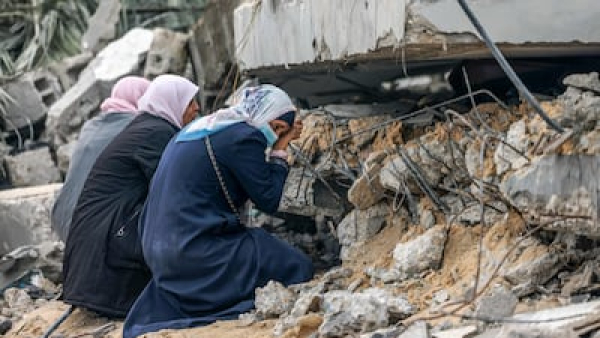zarezadeh
Iranian Embassy in Beirut congratulates Lebanese people on victory
The Embassy of the Islamic Republic of Iran in Lebanon, in a message to the Lebanese people and the country’s resistance, congratulated them on their great victory in confronting the Zionist regime. The message states: This glorious victory, which was achieved through the efforts and sacrifices of the loyal sons of the Lebanese people, represents the evolution of politics and the battlefield and proves its effectiveness in thwarting the aggressive plans against this honorable country and great nation.
The Iranian Embassy also pointed to the fulfillment of the promise of the Leader of the Resistance’s Martyrs, Sayyed Hassan Nasrallah, and emphasized that this victory was due to unparalleled sacrifices.
Finally, the Embassy saluted the pure souls of the resistance’s martyrs and all the innocent martyrs who sacrificed their lives for the honor, independence, and dignity of the Lebanese people.
Iran welcomes Lebanon ceasefire, stresses strong support for Hezbollah nation
In a statement emphasizing Iran’s firm support for the Lebanese government, nation, and resistance, Ismail Baghaei stated: Tehran has long emphasized the need for an immediate halt to Israel’s aggressions against Gaza and Lebanon and has made extensive diplomatic efforts in recent years. 14 months to achieve this goal.
The Iranian diplomat noted: The Zionist regime’s warlike policies and crimes, with the full support of the United States and some European countries, have led to the martyrdom of 60,000 innocent people, the injury of 120,000 people, the displacement of more than 3.5 million people in this country. The oppressed nations of Palestine and Lebanon, and the widespread destruction of vital infrastructure in the Gaza Strip and Lebanon
In light of the interim rulings of the International Court of Justice to prevent acts of genocide [in Gaza] and the International Criminal Court (ICC), the arrest warrants have been issued for the leaders of the Zionist regime on charges of war crimes and crimes against humanity. World public opinion has been demanding an end to the war and genocide for the past 14 months and is now waiting for the trial and punishment of the country's criminals. Baghaei stated: The occupying regime.
The Iranian Foreign Ministry spokesman stressed: The international community has the responsibility to maintain peace and stability in West Asia and to exert effective pressure on the aggressor Israeli regime to stop the Gaza war.
The ceasefire between Israel and Hezbollah took effect at 4 a.m. local time in Lebanon (0200 GMT) amid hopes that the ceasefire would lead to a permanent end to Israeli attacks on Lebanese cities and towns and a halt to more than a year of fighting in southern and northern Lebanon. Part of the occupied territories
US President Joe Biden says the agreement includes the withdrawal of Israeli forces from southern Lebanon within the next 60 days, and that the Lebanese army and government security forces will take control of areas in the south of the country.
UN Secretary-General Antonio Guterres has said that the UN peacekeeping force in Lebanon, UNIFIL, will also help implement the agreement.
Aisha's narration about Hazrat Zahra (peace be upon her)
عن عائشه، قالت أقبلت فاطمه علیها السلام تمشى، لا واللَّه الذى لا اله إلا هو ما مشیها یخرم من مشیه رسول اللَّه (صلى اللَّه علیه و آله و سلم)، فلما رآها، قال: مرحبا بإبنتى مرتین، قالت فاطمه علیهاالسلام: فقال لى: أما ترضین أن تأتى یوم القیامه سیده نساء المؤمنین، أو نساء هذه الأمیه.
Aisha said:
Fatima (peace be upon her) came, walking, -by the God other than whom there is no god- her walking was no different from the walking of the Messenger of God (peace be upon him and his family), so when the Prophet (peace be upon him and his family) saw her, he said: Well done, my daughter, twice. Fatima (peace be upon her) said: My father said to me: Are you not satisfied to be the leader of the believing women or the leader of the women of this nation on the Day of Resurrection?
Hamas says Netanyahu killed Israeli woman captive in Gaza
Hamas says a female Israeli captive has been killed in northern Gaza, holding Israeli prime minister Benjamin Netanyahu and his cabinet responsible for the lives of the captives.
Abu Ubaida, spokesman for al-Qassam Brigades, Hamas’ military wing, made the remarks on Saturday, as the Israeli regime continues it intensified bombardment of the Gaza Strip.
“The war criminal Netanyahu, his regime, and his military leaders bear full responsibility for the lives of their captives, as they insist on intensifying their suffering and causing their deaths,” Ubaida said.
Hamas says it has enough Israeli captives to swap them for the release of all Palestinian prisoners.
The spokesman went on to say that “after reconnecting with fighters tasked with guarding Israeli captives after weeks of lost contact, it was revealed that one of the Israeli female captives was killed in an area under the regime’s aggression in the northern Gaza Strip.”
“The life of another female captive who was with her remains in imminent danger,” he added.
Ubaida further stressed that Israel “must prepare to face the dilemma of the disappearance of the bodies of their dead captives, due to widespread destruction and the martyrdom of some of their captors.”
Around 250 people were taken captive on October 7 last year during Al-Aqsa Storm, a retaliatory operation by Gaza’s resistance groups.
Hamas released 105 of the captives during a week-long truce last November.
Public and diplomatic pressure has been mounting on the Netanyahu regime to do more to strike a deal for securing the release of captives still held in the besieged Gaza Strip.
Netanyahu has been obstructing mediation for a truce and a deal to release the 97 captives still held by Palestinian groups in Gaza. The Israeli military says 34 of them are dead.
Netanyahu has rejected a series of ceasefire proposals, including one from the US administration in May.
The Palestinian resistance groups have been seeking an end to the year-long Israeli aggression and the withdrawal of Israeli forces from Gaza.
At least 44,176 Palestinians, mostly women and children, have been killed and 104,473 others wounded since the war began last October.
Press TV’s website
Attempts to prevent the assassination of the Prophet of Islam (PBUH)
1) Stay away from Mecca: Now Abdul Muttalib has a dangerous task. The Prophet (PBUH) was very popular with his mother, maternal grandfather and paternal grandfather. Abdul Muttalib has lost his most beloved son Abdullah and his daughter Wahb has also become a widow two months after marriage. The product of the marriage is a very beautiful boy. But the importance of protecting him for his parents is also clear. He is not safe in the environment of Mecca, which is the place where the pilgrimage caravans travel, so a solution must be thought of. The solution is to keep him away from Mecca, and that too secretly and away from the eyes of foreigners. Therefore, the Prophet is entrusted to a nurse to keep him in a land far from Mecca and in secret.
Looking at the pages of history, we find that historians have mentioned reasons for entrusting the Prophet to a nurse, such as the lack of breast milk, the bad climate and its unsuitability for children, and Arab customs, all three of which can be easily criticized. :
a) It is clear that if the Prophet's mother did not have milk, they should have hired a nurse from the people of Mecca to raise him with them.
b) How long was the climate of Mecca unsuitable? Did this bad weather last for five years? There is no evidence from history that the climate of Mecca was bad during those years. Moreover, if this was the case, the Meccans or at least their children would have all migrated to other lands, which did not happen.
c) If the custom of the people of Mecca was to entrust their children to nurses, then why did other Arabs entrust their children to nurses? Even those who were born at the same time as the Prophet (PBUH) or after him were not entrusted to nurses. It is said that the Prophet was breastfed by his mother Hamza for a while. Why was Hamza, who was two months older than the Prophet, not given to a nurse? Furthermore, the baby was only breastfed for two years, so why was the Prophet sent to Halimah for five years? So, as mentioned earlier, since it is common for strangers to enter and leave Medina, it is easy to assassinate people in the city; hence, the only way forward for Abdul Muttalib is to make the Prophet absent.
But why did Abdul Muttalib return Muhammad (PBUH) to Mecca after five years? There are reasons for this in history, including the famous hadith (Shaq Sadr) which states: When the Prophet was with Halimah, he was going to the shepherd with his children. One day, a man came and cut Muhammad's chest and took out a clot of blood and said: This is Satan's share from you. Then he washed the place in a golden basin with Zamzam water and left. The children ran to Halimah and shouted that Muhammad had been killed.
After that, Halima returned him to his grandfather and said to Abdul Muttalib: I cannot take care of your child because he has been possessed. Abdul Muttalib also accepted him. It seems that this hadith was fabricated to lose the main line of the story. In fact, the reason for the Prophet's return to Mecca was that they had identified the Prophet and wanted to take him with them. Other hadiths also confirm this. That area was no longer safe. Therefore, Halima was no longer able to protect the Prophet.
If the Jews had also asked Prophet Moses (peace be upon him) the name of the wet nurse, they would have found him in the first week. It took five years to find the Prophet only because of the Jews' poor information in this regard. Probably, when they found the Prophet, there was a security vacuum in the work of maintaining information about the Prophet in Mecca. From then on, Abdul Muttalib became the Prophet's guardian.
2) Continuous protection: After Halima returned the Prophet to Abdul Muttalib, he personally took over the Prophet's protection. Abdul Muttalib's behavior shows that the importance of protecting this child was very clear to him, because he would even take him with him to the meetings of the Dar al-Nduh and put him in his place.
After Abdul Muttalib, the protection of the Holy Prophet (PBUH) was entrusted to Abu Talib. He gave up trading for four years until a famine struck Mecca. Abu Talib went into trading and took the Prophet (PBUH) with him, and the incident of Bahira occurred. There are so many differences in the narration of the story of Bahira that it shows that they want to distort and trivialize this story in a way that shows that they want to distort and trivialize it, while this story is very insightful in revealing two things: 1. The dissemination of information about the Prophet at that time and the volume of discussion about it was very abundant. 2- The extent of the danger of the Jews to the Prophet was to the extent that Bahira also knew this and asked Abu Talib to return him to his city so that the Jews would not lay hands on him, because he was not a librarian. Who does not know that he was born and if they see him, they will definitely recognize him.
Bahira's warning is a sense of danger for the Prophet. The Jewish hostility towards the Prophet is so great that Bahira, who is a Christian scholar, also understands it and thinks that Abu Talib is unaware of it. Abu Talib returns the Prophet from there and it is interesting that after that seven Jews came to Bahira to assassinate the Prophet. The important thing is that after this incident, Abu Talib never traveled.
Abu Talib spared no effort in supporting the Prophet (PBUH). He would eat food at the table before the Prophet to see if it was poisoned, then he would put it in front of the Prophet. He would sleep next to Muhammad at night and make the children sleep next to him so that if they tried to assassinate him at night, he would wake up. Abu Talib first went everywhere himself to make sure that there were no enemies. The Prophet (PBUH)'s situation remained the same until he was 25 years old. At this age, the Prophet asked for a trade. Now he is a young man who no longer has the courage to assassinate him, and of course the Imam is certainly aware of the Jewish plan. The Jewish plans to prevent the birth of the Imam and assassinate him failed and they moved on to the next stage of their operation, which was to prevent the spread of Islam and the conquest of Jerusalem by the Imam.
Israel destroys 8-story residential building in Beirut missile attack
The Israeli regime has targeted with missiles a residential building in the heart of the Lebanese capital of Beirut, leaving at least 11 people dead and 63 others wounded as the occupying entity ramps up its aggression on the Arab country.
Israeli missiles struck an eight-story residential building and “completely” destroyed it in the Basta area of Beirut early on Saturday, Lebanon’s al-Mayadeen television network reported.
The surrounding buildings also sustained significant damage, with the explosions heard across a wide area and reverberating throughout Beirut.
Lebanon’s National News Agency (NNA) confirmed the dawn Israeli attack and said “five missiles” struck the residential building in the heart of Beirut.
“Beirut, the capital, woke up to a horrific massacre, as the Israeli enemy’s air force completely destroyed an eight-story residential building with five missiles on al-Mamoun Street in the Basta area,” the news agency reported.
The strikes came a day after the Israeli bombardment of Beirut’s southern suburbs demolished an 11-storey building.
The Lebanese Health Ministry said another Israeli aggression in the south of the country killed at least five paramedics in southern Lebanon.
Hezbollah targets Haifa, Khiyam
Al-Mayadeen television network also reported that the Lebanese resistance movement Hezbollah confronted the Israeli occupation forces across the country’s southern areas and border villages, especially in Khiyam.
The resistance group “intensively” targeted with missiles and drones the gatherings of Israeli soldiers in a number of settlements and bases in Haifa, Acre and the occupied Golan Heights.
The resistance media said the movement “targeted the gatherings of the occupation forces on the eastern outskirts of Khiyam 8 times, from the early hours of Friday dawn until the evening, with rocket salvos and suicide drones.”
The media reports said rocket impacts were documented in a factory in Kiryat Ata, north of Haifa.
The death toll from the Israeli aggression against Lebanon since October 2023 has surpassed 3,500. More than 15,000 others have also been injured.
Most of them have lost their lives in the past month amid the intensified airstrikes and a ground offensive.
Hezbollah has been putting up firm resistance in the face of the Israeli regime’s aggression against Lebanon.
Press TV’s website
Iran activates advanced centrifuges in response to 'unfair' IAEA resolution
Iran has condemned an "unjustifiable" resolution passed by the UN nuclear agency against the country's peaceful atomic program, ordering the activation of advanced centrifuges in a reciprocal response.
In a joint statement released early on Friday, Iranian Foreign Ministry and the Atomic Energy Organization of Iran (AEOI) said directives had been issued to "initiate the operation of a substantial number of advanced centrifuges of various models."
The measure, which is taken to safeguard Iran’s national interests and address its growing need for civilian nuclear program , lies within the framework of the country’s rights and obligations under the Comprehensive Safeguards Agreement, they said.
The joint statement came after the International Atomic Energy Agency (IAEA)'s Board of Governors voted 19 to 3, with 12 abstentions, for the resolution that alleged Tehran had a poor cooperation with the agency and requested a "comprehensive" report on its nuclear activities "at the latest" by spring 2025.
The statement said that the "non-consensus" motion was approved under the "pressure and insistence" of Britain, France, Germany and the United States, despite lacking the support of approximately half of the 35-member Board of Governors.
It noted that the aforesaid states had proposed a "politically motivated" resolution against the Islamic Republic, rather than fostering the constructive atmosphere established during the IAEA Director General Rafael Grossi's recent visit to Tehran.
"In this context, the actions of the three European nations and the United States—countries with a documented history of reneging on their commitments, including under the Joint Comprehensive Plan of Action (JCPOA), and resorting to unlawful sanctions and pressures against the Iranian nation—are both confrontational and unjustifiable," read the statement.
"This politicized and destructive measure undermines the positive momentum achieved between Iran and the Agency and blatantly contradicts the professed commitment of the three European nations and the United States to preserving the integrity and impartiality of the IAEA. It lays bare their use of the nuclear issue as a pretext to advance illegitimate objectives."
It also reaffirmed Iran's resolve to continue its cooperation with the IAEA as before, strictly in accordance with the Safeguards Agreement.
"The principled policy of the I.R. of Iran has consistently been to engage constructively with the International Atomic Energy Agency (IAEA) within the framework of rights and obligations enshrined in the Treaty on the NPT and the Comprehensive Safeguards Agreement," it asserted.
Speaking after the vote to Press TV, Mohsen Naziri Asl, Iran’s permanent representative at the United Nations office in Vienna, said the resolution came despite "good promises" made by Grossi during his recent visit to Tehran.
Grossi said on Wednesday that Iran agreed to cap its stockpile of 60%-enriched uranium and to accept new inspectors the agency needs to have in Iran. He said that day that it was "a concrete step in the right direction," suggesting that he felt a resolution could undermine that progress.
"This resolution does not look at those promises as well as the roadmap we have agreed with the DG to move forward," Naziri Asl said, stressing, "Our reaction is of course in accordance with our legitimate rights."
Iran had already warned that any resolution against its peaceful nuclear program would be met with a quick response.
In 2015, Iran proved the peaceful nature of its nuclear program to the world by signing the JCPOA with six world powers.
However, Washington’s unilateral withdrawal in 2018 and its subsequent re-imposition of sanctions against Tehran left the future of the deal in limbo.
In 2019, Iran started to roll back the limits it had accepted under the JCPOA after the other parties failed to live up to their commitments.
Press TV’s website
Jewish Terrorism and the Conspiracy to Prevent the Birth of the Prophet of the End Times
The Jews tried to extinguish this light by identifying the light of prophecy in the ancestors of the Prophet (PBUH) and matching it with the signs mentioned in the divine books.
1) Assassination of Hashim: Hazrat Hashim is the great-grandfather of the Prophet of Mecca, but his grave is in Gaza, Palestine! He left Mecca for trade to Sham and in Yathrib became the guest of the chief of one of the tribes settled in Medina, named Amr bin Zaid bin Labid Khazraj. Hashim married Amr's daughter, Salma. After the marriage, Hashim took his wife to Mecca. When Salma became pregnant, according to the conditions they had at the time of marriage, he returned her to her family in Yathrib to give birth and from there went to Syria to trade. When he left for the trip, he advised his wife that he might not return from this trip. God will give you a son, take care of him.
Hashim goes to Gaza and after finishing his work, on the same night on his return, he suddenly falls ill. He calls his companions and tells them to return to Mecca. When you reach Medina, greet my wife and advise her about my child who will be born to her and tell her that he is my greatest concern. So he asks for a pen and paper and writes a will, a major part of which is his advice to protect the child and longing to meet him.
Prophet Moses had informed the Jews of the arrival of the Holy Prophet (PBUH). They were aware of the appearance of his parents and lineage, and they had a treasure trove of information at their disposal, and they were masters in the science of facial recognition that they had learned from Moses and passed on to them from generation to generation. Therefore, Hashem was familiar to them in their faces and the Jews knew very well that the Prophet of the End Times was from his lineage. But their arrow hit the target late.
2) The murder of Abdul Muttalib: Hashem's son was born and raised in Medina and was named Shaybah. On Hashim's advice, his mother took care of him and it is interesting that the mother did not remarry.
One day, a man from Banu Abd Manaf who was going to Yathrib for business saw a child playing and calling himself Hashim's son. He asked him. He introduced himself and the man told this to Mataleb. Mataleb kidnapped the child and took him to Mecca. In another narration, he did this with his mother's consent.
When Mataleb and Shaybah returned, the Jews recognized them and attacked them, but they miraculously survived. When Mataleb brought him to Mecca, the people thought that he was Mataleb's slave, so they named him Abdul Muttalib and this name stuck to him.
3) Assassination of Abdullah: The Jew could not assassinate Abdul Muttalib and Abdullah was born to him. Abdullah is from Medina, but his grave is in Medina, in the Jewish quarter. The stories about him are more explicit and the Jews tried to assassinate him many times and failed.
One day, Wahb ibn Abd Manaf, a merchant in Mecca, saw Abdullah, who was then a young man of 25 years old, surrounded by Jews who wanted to kill him. Wahb was frightened and went among the Banu Hashim and shouted: Abdullah is surrounded by the enemies of the Prophet. Abdullah was miraculously saved. Wahb, who witnessed his miraculous salvation and saw the light of prophethood in his face, proposed to his daughter Amina and Abdullah, and this blessed marriage began.
It is narrated that the Jews sent a Jewish priest to become Abdullah's wife and to transfer the sperm of the Prophet of the End Times to this woman. So that woman met Abdullah every day on the way and proposed marriage to him, but the day after Abdullah married Amina, he did not propose again. Abdullah asked him why he did not repeat his previous statement this time? He said: The light that was in your forehead is no longer there. Abdullah was married (Ibn Shahr-e-Ahub, vol. 1, 26).
A few months after their marriage, while Amina was pregnant, Abdullah died in Medina on his way back from Syria (Al-Tabari, vol. 1, 598). The Jewish arrow missed its target for the second time and Abdullah died suspiciously in Yathrib, but this attempt could not be traced.
4) Attempt to assassinate the Prophet: It is narrated that on the night after the birth of the Prophet (PBUH), a Jewish scholar came to Dar al-Ndawa and said: Was a child born among you last night? They said: No. He said: Then a son named Ahmad must have been born in Palestine and the destruction of the Jews will be at his hands. After meeting, they inquired and found out that a son had been born to Abdullah ibn Abdul Muttalib.
The man was informed that a child had been born among us, and by God, it was a boy! The Jewish scholar asked them to take him to the child. They took him to the child, and he fainted until he saw the child, and when he came to his senses, he said: By God! A prophet has been taken from the Children of Israel until the Day of Judgment. This is the one who will destroy the Children of Israel. And when the Quraysh saw that they were happy about this news, he said: By God! May He do something to you that the people of the East and the West will remember.
Muhammad (PBUH) was recognized from the very first day of his birth. The arrows of the Jews to prevent his emergence went astray, and now they must eliminate Muhammad (PBUH) to achieve their goal.
Reasons for the presence of Jews in Medina before the birth of Hply Prophet (pbuh)
Medina is the first capital of the Prophet's rule. It is stated in history that the Jews first came to Yathrib and founded this city. They settled in this area en masse long before the birth of the Prophet. The Jews had heard that the Prophet of the End Times would come to Yathrib and had complete information about it.
They claim that they came to Medina to find the Prophet of the End Times and believe in him, but by examining the course of history, we doubt the veracity of this statement. If so, why did they not believe in Jesus (peace be upon him), who showed many miracles? In addition, it is worth asking why the Jews, who knew that the Prophet of the End Times would be sent to Mecca, did not come to Mecca? Why did they settle in an area that was uninhabited? The Jews knew that the Prophet of Islam (peace be upon him) would be established between the two mountains of Ir and Uhud, and therefore they settled in this area. Here the question arises, why did the Jews disperse in the land of Hijaz when the area between these two mountains is a limited area?
They claim that they made a mistake in finding the location of this area, so some settled in Khaybar, some in Tabuk, and some in other areas. But this claim is nothing more than a lie, because by looking at the map of these areas, we realize that these areas are right on the road from Medina to Jerusalem. By settling in these areas, they easily blocked the Prophet's path to Jerusalem. If the Prophet wanted to go from Medina to the land of Canaan (Palestine), the Jews would be against him. If he passed through Iraq, he would reach Fadak, and if he passed through Medina, he would reach Khaybar. How can we accept that they settled in his capital by chance and accident!?
The Prophet had been in Mecca for thirteen years, and the Jews were aware of his mission; even one of the Jewish scholars, on the day of the Prophet's birth, identified him. How could the Jews of Medina not know that the Promised Prophet was born in Mecca? If they came to Medina to help the Prophet of the End Times, why did they not believe in him in Mecca even though they knew him well? Long before the birth of the Prophet (PBUH), Hashim said to his wife while passing through Medina: If the Jews find this child (Abdul-Muttalib), they will kill him. This was the time when the Jews were saying to the people of Medina: This Prophet is for us and we have believed in him.
Thus, we find that the Jews came to Medina and its surroundings to prevent the Prophet (PBUH) from entering Jerusalem. Looking at the map of the Jewish settlement in the Hijaz, it is easy to see that the Jews built an embankment from Medina to the walls of Jerusalem. They had provided extraordinary military fortifications and huge obstacles on this path. The Prophet had to overcome seven obstacles to reach Jerusalem. Ibn Yaqridah, Banu Mustaliq, Ibn Yandir, Khaybar, Tabuk, Mutah and Jerusalem. The first three embankments were in Medina and the Jews stationed there, each at a specific time, fought the Messenger of God (PBUH). In the subsequent obstacles, the Prophet advanced to Mutah in various battles, but due to the cunning of the Jews, he did not reach Jerusalem.
God entrusted the mission of conquering Jerusalem to the Al-Muwahhids. (Old Testament, Chapter 26) That is why the Prophet of Islam moved towards Jerusalem. According to Jewish sources, if the Prophet of the End Times seizes or settles in a land, he will not lose it again, and therefore, if the Prophet of Islam reaches Jerusalem, the Jews must abandon the global movement; for this reason, the Jewish barriers and strongholds of Banu Qaynuqa, Banu Qurayza, Khaybar, etc. were established in Medina to Jerusalem.
These fortifications were built over many years. The fortifications of Khaybar dug a ditch on the mountain, built a wall on the ditch, and built a castle on the other side of the wall, while they had no enemies in Medina. Therefore, we understand that they had already planned a heavy defense against the Prophet of the End Times. In practice, we saw that they made the most of these castles in the war with the Prophet, then delayed the Prophet (PBUH) in Tabuk. The result of these efforts was the defeat of the Prophet (PBUH) in the last battle at Mu'tah.
Usama's army was the last force that the Prophet equipped to move towards the borders of Rome and modern Palestine. However, with the death of the Prophet (PBUH) and the sabotage of well-known individuals in history, this army stopped moving, and unfortunately, the Jewish delaying operation was able to prevent the Prophet (PBUH) from reaching Jerusalem.
71 killed in Gaza in 24 hours
According to the Gaza Health Ministry, Israeli attacks on Gaza have killed 71 people and injured 176 in the past 24 hours.
The ministry said the casualties brought the total number of casualties in the war in Gaza to 44,056. A total of 104,268 people have been injured in the region.
